Just love what you love and let that be the work that you do.
It was a true pleasure interviewing Ted, as I have an incredible amount of respect for him as a person, performer and filmmaker. He’s so talented and is such a genuinely kind human being. We met at iO on a late November morning and, truth be told, divulged a great deal of personal details, some of which are included below and some of which are not. The level of honesty we were able to share with one another was quite refreshing. Aside from that, we talked about his award winning film work, challenges he’s had to overcome as a man as well as an artist and his constant struggle with being a hopeless romantic.
As I was trying to figure out how to formulate my questions for you, I couldn’t really determine any one place to start. So I decided to start with: Ted Tremper, who are you?
Oh gosh, I don’t know. I’m trying to find that out. I hope I’m somebody who loves the work of the people that he loves. That’s a big question to warm up. Let’s see, I’ll tell you who I hope I am and I’ll tell you who I fear I am.
Ok.
I hope I’m somebody who allows the fact that they have fallen in love with an artform, and the people who perform that artform, well enough to fill his life with spontaneous artwork and the ability to share that with other people. I hope I’m somebody who is developing a set of skills to disseminate that work to other people who are willing to believe that art can be created out of nothing, in the moment and be meaningful. That’s who I hope I am.
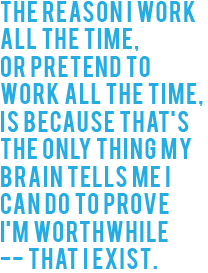
I think I have the same fear that everyone has — that time is completely running out. I have very low self-esteem at times, but somehow I’ve managed to surround myself with truly amazing people whom I love more than anything. The fact that they exist in my life and seem to love me back, operates as a counterpoint to my mind’s desire to write myself off as a no-goodnick who can’t do nothin’ for nobody.
I’m very self-conscious. The reason I work all the time, or pretend to work all the time, is because that’s the only thing my brain tells me I can do to prove I’m worthwhile — that I exist. The people who know me really well know that about me and help me laugh at that.
The first several years I was here in [Chicago], I think I presented this façade of someone who was very confident and that manifested itself into a pretty egotistical asshole. The motivation was pure — just trying to get better at the thing that I love the most, which is improvisation — but boy, was I a real piece of shit to some people. I can’t say for sure that I’m still not. I don’t think I am. I certainly hope not. Feel free to call me out on it if you see it.
I’m a man who doesn’t love himself, but sure wants to … or maybe I don’t. The adaptation I’ve found to give me a kind of side-door access to happiness is to invest in the greatness of other people who inspire me and find ways to make that happen through work and through trying to treat people with great kindness and respect. I’m constantly revising this set of conditions and rules to live by, and I hope that if I live by them, they will be the magic trigger that will allow me to have this cascade of acceptance and love of myself. It’s a kind of neurotic emotional Bushido if that makes sense. Does that answer any of that?
I had no idea where you were going to take that and I had no idea you were going to take it that way. That’s so much more that I didn’t know.
The happy way to answer the question is that I’m a guy who likes making stuff with the people he loves and respects. Also, this is the kind of conversation I would have with you as a person not as a journalist and I’d want you to feel free to share it with other people so hopefully it gives people the opportunity to see me for who I really am … or who I currently think I am.
So when did you start improvising?
I started improv as a student at iO January of 2008. But I’ve been improvising since my junior year of high school. We had a really great drama teacher who created a local version of “Who’s Line Is It Anyway?” before the show even came out. He was really into improv, so we did a lot of improv stuff. Then in college, my second semester there I started improvising with a group. That group became really popular on campus and we sold out shows for three and half years. 170 seat theatre. It was great. It was all short form, but it was super fun and I knew I wanted to do improv.
But then I went to Japan and lived in Japan for a year. The girl I was dating got accepted into a school in New Haven, Connecticut, so we went there. I tried to improvise with a team at Yale, but since I was not a Yale student, everyone was freaked out about a non-Yale student being on the team and it didn’t work out.
Wait, time out. What originally brought you to Japan?
I was teaching English. My girlfriend, at the time, was an entomology major and we wanted a place where we could be together and just kind of take a year off and figure our lives out. So we moved to Japan to teach there. Then we moved to New Haven together and I got super depressed. My entire life was on hold and no matter how much I loved her I couldn’t excuse the fact that I couldn’t execute any of my dreams or goals in New Haven, Connecticut. So I applied to the School of the Art Institute in Chicago to pursue writing. It was the only masters program that would allow me to dabble between disciplines and I knew I wanted to work in film and writing. So we broke up, I went home and then I moved to Chicago.
Where’s home?
Near Seattle. My family still has a home in North Bend, Washington. My mom died when I was 20, and my sister moved into the house my dad built for them to retire in. My dad still lives in the area too.
I’m sorry to hear that.
It’s ok. It’s a thing that happens to every human being and living thing.
That’s so sad.
It is sad.
Well, we don’t have to talk about that.
No, it’s ok. I told you the only rule I have is that you have to ask me every question that comes to you.
Ok, then if I have ask every question, how did your mom die?
She had this very rare autoimmune disease, called Stills disease. It’s kind of like Lupus times 100. Only about 400-500 people in the world have it at any given time. From when I was 8-12 she had this disease, then it went into remission and it came back when I was 16 or 17 and she died when I was 20. The event of her dying was really horrible because my brother and I were at the house when it happened and I was trying to save her life but failed to do so. One of the pieces of guilt I’ve always had was whether or not me failing to do CPR correctly on her was the thing that caused her to die.
Oh Ted, you can’t do that.
I know. It’s a really horrible and life-changing thing to feel responsible for more or less killing the person that I loved the most. I don’t know if there will ever be a time where I don’t feel responsible for that. That has shaped what we spoke about before: My ability to feel good about myself and be happy because it is very much so cloaked by the deep-seeded belief that I am solely responsible for my mom’s death.
Ted, you can’t do that!
Haha, I know you can’t do that, but I can’t not do that. But that’s the whole thing. I go through periods where I’m fine with it, but my mom’s big thing was that everything is a learning experience; you always need to learn from things. So I think my way of disarming this is by talking about it and externalizing it because I’m able to pull it away from me a little bit. But if we’re talking about why I do the things I do and why I am the way I am, that’s a huge part of it.
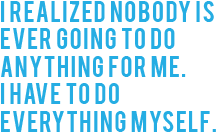 Ok, let’s deviate a little bit and talk about a few other things as well before our time runs out. So you went to the School of the Art Institute of Chicago for film or writing?
Ok, let’s deviate a little bit and talk about a few other things as well before our time runs out. So you went to the School of the Art Institute of Chicago for film or writing?
Technically, I got a masters of fine arts in writing. SAIC was a great experience for me as an artist, because I realized nobody is ever going to do anything for me. I have to do everything myself. I had very rose-colored glasses about an MFA program, thinking that someone would hold your hand and pull all the creativity out of your brain and help you turn it into something that would be really great. But that’s not how that functioned at all. I constantly felt completely alone. The good part about it is that it helped create a person that believes that no one will help me make the things I want to make. Learning that lesson cost me $45,000 or something like that. So basically, every month when I pay my $500 to this school, it’s a reminder that I have to keep working as hard as possible. So that’s the good thing, to have a constant reminder of that for the next 15 years.
God, that’s terrible. But did that push you into film?
My experience in the writing department pushed me into film because I realized I didn’t have any interest in writing. Some of the faculty members in the film department were super helpful though. My cinematography professor, T.W. Lee, was teaching us about all the things to do when you don’t have access to the cameras or equipment you got at the school. At first that was really infuriating to me, but learning how to improvise with lights, equipment, cameras and crew became the the sole reason that I was able to create things fully independently on my own afterwards. He’s solely responsible for anything I’ve done that looks halfway decent. So my experience in the writing department lead me to do what I actually wanted to do, which was to make independent projects.
Well one of those projects was your web series, “Break-ups.” What was that process like?
For “Break-ups” I wanted to use improv to generate scenes within a form that would appeal to people outside of the improv community. The tagline for that series was “If you’re alive, you’ve had one,” which is pretty much true. The goal in creating that series was really to have them be more personal expressions of that experience and improvised in a way where people question what the writing process was like, even though it wasn’t written. I feel like whenever people assume something is written when it’s actually improvised, it’s sort of a melancholy compliment for improv.
So when you put together the two improvisers for Break-ups, did you just say,
“Ok, go for it” and then you shot everything they did?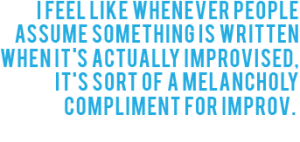
No, I asked one person I wanted to be in an episode and I told them they could pick whoever they wanted to be their scene partner and we could do anything. I encouraged them to think of something that’s impossible but don’t preplan it, just think of a “feel” you want to go for. If there’s a point of inspiration you want to draw on, we can go from that. Like in Seth and Kellen’s episode, Kellen wanted his thing to be that they were having sex and Seth punched him in the face, which is why he has that pork chop on his eye. That’s the start of it and then we just find the scene through improv.
The thing that was making us laugh every time was Seth coming up with these insane hypothetical things that would turn him on. It became pretty obvious the thing that made us all laugh was Seth saying all these weird sexual scenarios, so we just did a bunch of those. For Beth Melewski’s, she just said she wanted to beat the shit out of Andy St. Clair in front of a hospital. Paul and Cecily’s was the third episode, so it turned into a tonal thing, because I wanted to make sure we were setting up an emotional spectrum within the first three episodes.
The process for filming was typically that we did 15 minute long takes of characters getting to know each other. As a director, I kept mental track of what details were brought up that were really interesting to me, but also paying attention to the actors to try to see places maybe they didn’t go because maybe they didn’t feel like they could go there or didn’t want to go there. Then asking them to go there in subsequent takes. As an editor, it was really important for me to get it all in one take, so I could prove it was improv.
The thing that’s nice about doing an emotional improvised scene is that you can hide behind a character even if you say things that are 100% truthful. You always have this mask to hide behind. Sometimes I forget that when I’m talking to people as myself — I don’t have anything to hide behind.
That’s funny, because I kind of feel the opposite of that when I’m on stage sometimes. I feel like the best thing I have to offer is that I’m super honest. Sometimes I get on stage and I disclose all this information about myself without realizing.
But the audience doesn’t know.
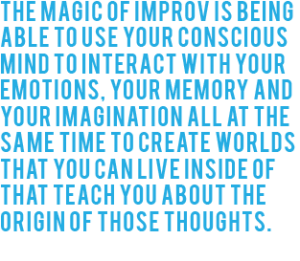
I know, but it’s like this guilty feeling like I cheated on myself. Like “Oh, I shared my own secrets.” It’s a really weird feeling.
No, you should feel the opposite. Knowing a lot of the really wonderful improvisers that are in Chicago as well as I do now, when I see things that I know are true of them, sure they are true of their characters because they are their characters, but it’s really wonderful. I’m in this group called Almost ATLANTA that does improvised plays and the most meaningful show I’ve ever done was immediately after this horrible breakup with my most recent relationship. I came directly from a really terrible reopening of this wound and beforehand, I was just uncontrollably weeping. Then when I went on stage, the first thing my character did was just start crying and it became this really wonderful silly show with this crazy storyline.
The magic of improv is being able to use your conscious mind to interact with your emotions, your memory and your imagination all at the same time to create worlds that you can live inside of that teach you about the origin of those thoughts, which is a nice thing to dick around with on a Friday.
Haha, it’s getting heavy.
That’s a good quote, pull that quote. That makes me seem like a real pretentious douchebag.
Haha, ok. I want to talk about Shrink, your fully improvised TV pilot. Tell me a bit about where that inspiration came from.
I was on the Second City ship at the time and I was meditating. [Within the meditation] I had this image of Mick Napier and I was sitting across the table talking to him. It was this weird set up where we were just asking each other questions and it felt very much like a therapy thing. When I came out of the meditation and I wrote the idea of doing improvised therapy sessions on this mirror I kept dry-erase notes on. The title “Shrink” came later in another mediation session. Meditating is just great to work out creative ideas and allow your brain to go wherever it wants to go.
Ok, so you got back from your boat, then what did you do?
I originally wanted to be the therapist because I was trying to figure out how I could improvise with all the people who were my improv heroes, but at the same time I came up with that idea, I was editing Tim Baltz and Mary Sohn’s episode of Break-ups. Tim is just a fantastic actor. He’s an amazing improviser, but he’s also a great actor. Knowing that I’m not even 10% as good as he is at either of those skills and loving having worked with him before, I approached him to do the show.
What it was like working with Tim? How did you originally pitch him the idea? How did you get everything set up? How did you loop in all of the improvisers, etc.?
Before the Second City Christmas party, I asked him to meet me at the Starbucks and asked him if he’d be interested in this idea where he plays David Tracey, this therapist who didn’t match after graduating medical school and is now $586,000 in debt. But the back story comes from three friends of mine that are in medical school and they told me about matching, which is basically like a residency, after you get out of medical school before you can become a doctor. For all intents and purposes, you have to do four more years of training at a hospital. You do these interviews at hospitals and after graduation you get your matches and see where you match up to do your four years. About 3-5% of doctors don’t match, which means they have to take a forced year off with hundreds of thousands of dollars in student loan debt.
So, that’s what the show is based on, this therapist who is in limbo for a year because he didn’t match. Like Break-ups, it’s all about creating a theme that improvisers can improvise around that will immediately translate to a non-improv audience. Creating an emotionally powerful situation that people get right away, so that the fact that it’s improvised becomes irrelevant, but created immediate interest when it is discovered after the fact. Improv ought to be irrelevant to the quality of the performance, but what I’m hoping to do is to convert people to realizing how incredible improvisation can be. That’s my sole artistic goal.
Ok, so you submitted Shrink for the New York Television Festival 2012 and won two awards. What was that like?
Before anything even happened with the production of Shrink, I knew I wanted to submit it to the New York Television Festival, so I essentially made Shrink for this festival. We won Best Comedy Pilot, which is really significant because I think 80% of the 52 pilots they accepted were comedies. We also won the New York Television Festival Critic’s Choice, which I think the board and 12 national television critics voted on that, so that was pretty awesome.
That is pretty awesome. So, what happens now?
Baltz and I have the same agents, so the goal is to get it green lit, get money, get all the people we had in the original pilot in it again. I’m not sure if that will ever happen. Here’s a secret — literally, every time I’ve ever had the opportunity to make a wish in the last year, I’ve wished … well I can’t tell you because that would negate it, but it involves being able to make that show happen: To create the first solely improvised television program.
There’s also an all female group I’m working with which I hope to be the first all-female sketch comedy group that’s ever been on television. So those are the two big things I’m working on right now.
That’s awesome. So after the New York Television Festival, you went to Geneva, Switzerland. Tell me about this.
It was a week that was so good that it ruined my life, I think.
Haha, oh my gosh. That’s such a sweeping statement.
It was the best. I showed up and since Break-ups had won the award for Best Web Series the year before, I was a jury member. So it was eight days in the most beautiful city I’ve ever been in and I met about 40 people who I hope will be my friends for the rest of my life- beautiful, amazing, wonderful people. We all instantly fell in love with each other.
I almost just stayed there. I love Chicago and I love what I’m doing here, but I was living a fantasy existence where my only to-dos were to meet wonderful new people and watch amazing new films.
But, that’s one week every year. You can’t do that every day.
Yeah, but it was also my first vacation in five years. So that’s another part of it. Falling in love with the city and the people is an amazing thing. And it’s hard to reconcile when you come back to work and you have to grade a thousand pages of student papers.
Where are you working?
I’m a professor at FlashPoint.
Is that full-time or part-time?
I teach two sections of a class, so I’m an adjunct professor. Then I also am an understudy with Second City’s Touring Company and I’m trying to make TV shows. So those are my three jobs.
Those are pretty fun jobs.
Yea, they’re all pretty great. I love them.
So outside of acting, improvising and filmmaking, I know you are learning French right now. Are there any other talents and ambitions that you would like to share?
I’ve been doing the Paleo diet and a huge part of my time is invested in that. It’s a huge life change because food used to be my vice. I don’t drink. I don’t do drugs. I don’t sleep around as much as I’d like to…
Haha, what? Who says that?
I’m just messing around, but I’m sure lots of people say that. I feel like people are either in a state of wanting to fall in love or wanting to just nail a whole lot of people. I’ve always been the former wishing I was the later.
But you don’t want to just sleep around with people just to sleep around!
No, I don’t!
You sound a bit like a hopeless romantic, so I don’t believe that at all.
I am a hopeless romantic! Wait, let me rephrase what I said: I don’t sleep around as much as I would like to like to sleep around. There, is that better?
That’s better. That makes more sense. I can relate to that.
I want to be in love all the time.
Yes. If the situation ever presented itself, I don’t think I’d do anything about it.
No, me neither.
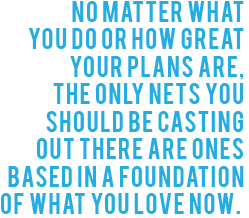
That’s the thing, I want to be in love all the time, too. I wish I was with the person I knew I would be with for the rest of my life right now. That’d be great.
That’s a good way to put it. Yup. But here’s my thing, I was with that person — my last relationship. I bought an engagement ring while I was on the ship. I was sure that I was going to marry her, but then the circumstances changed drastically and I lost faith of the idea of being with somebody in that way. I’ve been referring to this period of my life as my Mark Twain years, because I thought I had everything set up for the rest of my life and it all went away. But now I’m just trying to say “yes and” to everything.
That happened to me. I found improv and I just stopped planning…but now I get nervous that I have no plan.
You don’t need one.
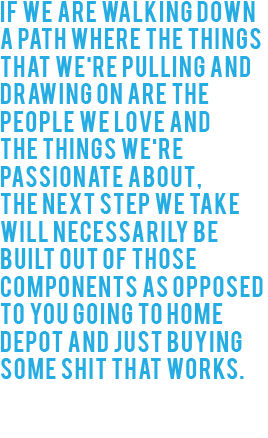 Good, because I don’t have one.
Good, because I don’t have one.
No matter what you do or how great your plans are, the only nets you should be casting out there are ones based in a foundation of what you love now. Here’s a visual metaphor: it’s like in the first X-Men film, where Magneto is walking and all of the metal pieces are just flying in and building this bridge he needs to walk on. If we are walking down a path where the things that we’re pulling and drawing on are the people we love and the things we’re passionate about, the next step we take will necessarily be built out of those components as opposed to you going to Home Depot and just buying some shit that works. Because you could do that and it would work, but it would just be a way to fix a problem, not necessarily a way to live your life.
Well said, what scares you the most about comedy and this career path of entertainment?
The thing that scares me the most currently is accepting work that brings me money but not artistic satisfaction. I’ve always been building these two paths of total spontaneity and total planning: weaving a tightrope and a net at the same time. My biggest fear in comedy is doing something that is respected but that is not me. I’m afraid that I’ll settle. On my best days, I have the confidence to refuse to compromise and on my worst days, I’ll take anything I can get.
I think that happens a lot. So, what sacrifices have you made to pursue this passion?
The short answer is everything, but also nothing. The only regret I have is not pursuing this more doggedly earlier. Being in the position I’m in now: being who I am, where I am, how old I am with what I have, is that I have this sense of urgency I don’t think I would have had before. I feel have about two years until I’m too old to be young.
How old are you?
29. I feel like 31 it’s all over, but I don’t know.
Noted. What’s the hardest lesson that you’ve learned from the industry so far?
POB, Michael Patrick O’Brien’s big thing was “love your ideas and love your friends’ ideas.” I think that was the only advice he gave upon leaving Chicago. That’s the one lesson that took me the longest to learn because I felt like it couldn’t be that simple, but it really is. Just love what you love and let that be the work that you do.
You mentioned you’re working on the all woman sketch show and pursuing Shrink, are there any other projects you’re working on now?
Yeah, there are two different films I really want to write and one television pilot I really want to write. But the idea of sitting in a room and improvising with Tim Baltz and coming up with ideas that people would pay us for — that’s the dream. I’m very good friends with Eleanor Hollingsworth and I said to her, “I just want to make a thing that people really love,” and she said, “I think you’ve already done that a few times already.” I don’t know if that’s true, but knowing that people I love, love me and the things I make is more than enough … at least at the moment I’m saying this.
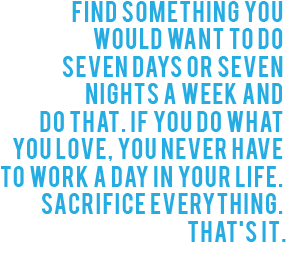 I would have to agree with that. I know you have to get going soon, so here’s the last big question: what is the greatest insight you have discovered about life and comedy?
I would have to agree with that. I know you have to get going soon, so here’s the last big question: what is the greatest insight you have discovered about life and comedy?
Get really in touch with what makes you laugh and the people that make you laugh and build a life where you spend absolutely every waking moment pursuing those ideas and spending time with those people. Find something you would want to do seven days or seven nights a week and do that. If you do what you love, you never have to work a day in your life. Sacrifice everything. That’s it.
Any final comments?
If you’re in comedy to be famous, get the fuck out. If you’re in comedy to make money, get the fuck out. Those should both be byproducts of doing what you love.





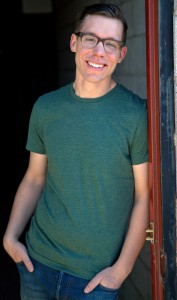

Pingback: Nine Major Players In Chicago Comedy to Watch Out for in 2013 - Life's a Funny Scene by Kiley Peters | Life's a Funny Scene by Kiley Peters